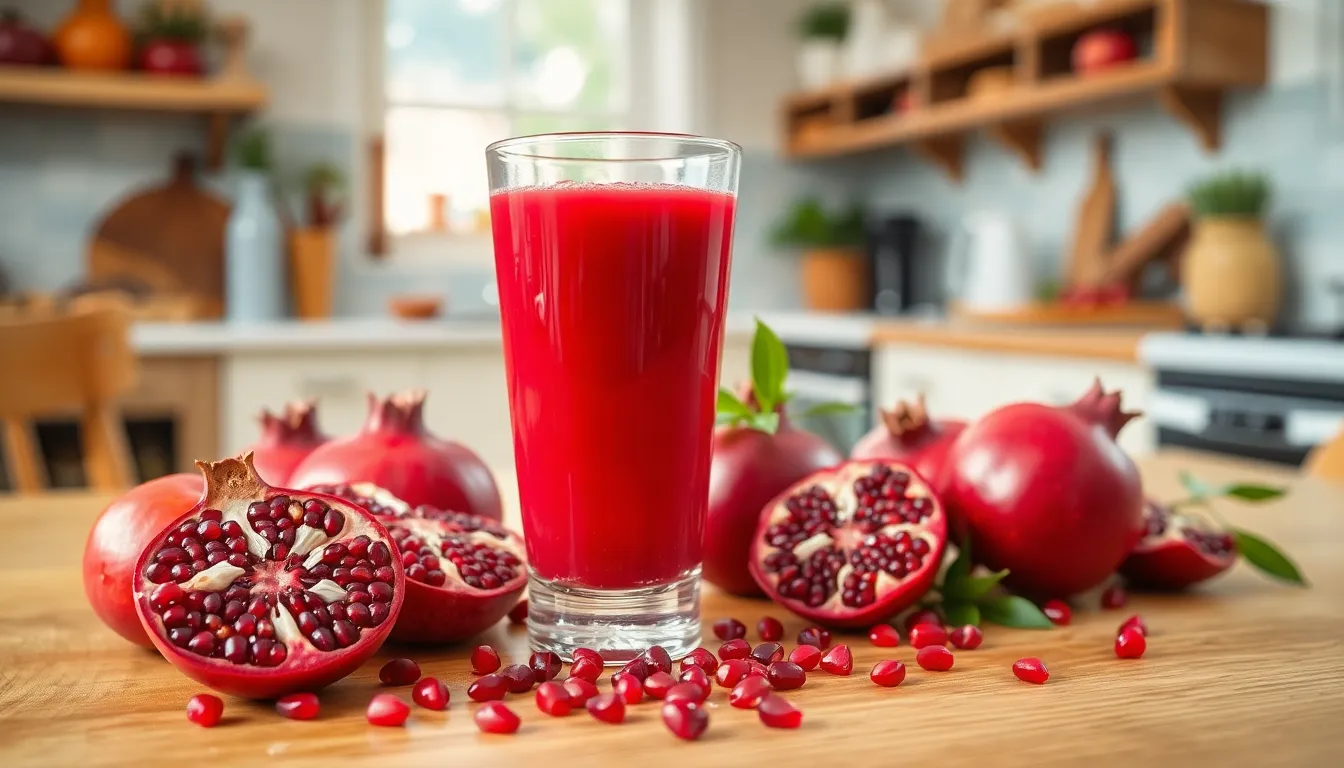Table of Contents
TogglePomegranate juice, or as it likes to call itself, “the elixir of life,” is making waves in the health world. With its deep ruby color and tangy-sweet flavor, it’s not just a pretty drink; it’s packed with nutrients that might just make your taste buds and your body do a happy dance. But is this trendy juice really as good for you as it claims?
Imagine sipping on a drink that’s not only delicious but also loaded with antioxidants. It sounds like a dream, right? Well, pomegranate juice is here to turn that dream into reality. From heart health to anti-inflammatory benefits, it’s got a lot to brag about. So, let’s dive into the juicy details and find out if this vibrant beverage deserves a spot in your daily routine.
Understanding Pom Juice
Pomegranate juice, often celebrated for its vibrant color and unique flavor, delivers numerous health benefits. Nutrient-rich, it contains high levels of antioxidants such as punicalagins and anthocyanins. These compounds play a crucial role in combating oxidative stress in the body.
Cardiovascular health benefits frequently attract attention. Research suggests that pom juice can support heart function by improving cholesterol levels and lowering blood pressure. Consuming it regularly might enhance arterial health, offering protection against heart diseases.
Additionally, its anti-inflammatory properties contribute significantly to overall wellness. Studies indicate that pom juice can reduce inflammation markers, which may help alleviate symptoms of conditions like arthritis. Athletes also benefit from its natural anti-inflammatory effects, facilitating quicker recovery post-exercise.
Immune support is another vital aspect of pom juice. Its rich vitamin C content helps strengthen the immune system, making it a helpful choice during cold and flu seasons. The presence of phytochemicals in the juice also supports the body’s defense mechanisms.
Bone health receives attention due to the presence of bioactive compounds in pom juice. Research shows that these compounds may increase bone density and strength, making it a beneficial addition to a diet aimed at preserving bone integrity.
Understanding the versatility of pom juice reveals its potential for enhancing daily nutrition. Incorporating it into smoothies, salad dressings, or simply consuming it straight can add flavor and health benefits. With its appealing taste and nutrient profile, pom juice stands out as a valuable option in a balanced diet.
Health Benefits of Pom Juice

Pomegranate juice offers various health benefits due to its rich nutrient composition. It’s a source of vitamins and antioxidants that contribute to overall wellness.
Nutritional Profile
Pomegranate juice contains essential vitamins like vitamin C, K, and several B vitamins. It also packs important minerals such as potassium and copper. In just 8 ounces, the juice provides approximately 130 calories, 30 grams of carbohydrates, and 2 grams of protein. This serving delivers a significant amount of dietary fiber, promoting digestive health. Phytochemicals found in the juice include flavonoids and polyphenols, known for their health-promoting properties. These nutrients play roles in maintaining energy levels, supporting metabolism, and enhancing immune function.
Antioxidant Properties
Pomegranate juice boasts a high concentration of antioxidants, particularly punicalagins and anthocyanins. These compounds combat oxidative stress, reducing the risk of chronic diseases. Consumption may lead to lower levels of inflammation and improved heart health. Studies show that pomegranate juice can enhance blood flow and improve cholesterol profiles, positively influencing cardiovascular performance. The juice’s antioxidants may also protect skin from damage caused by environmental factors, supporting skin health. Regular intake can contribute to overall longevity and improve the body’s resilience against oxidative damage.
Potential Risks and Considerations
Despite the health benefits of pomegranate juice, users should remain aware of potential risks. Understanding these considerations ensures a balanced approach to consumption.
Sugar Content
Pomegranate juice contains a significant amount of natural sugars. An 8-ounce serving typically has around 30 grams of carbohydrates, primarily from sugars. Excessive sugar intake can lead to weight gain and other metabolic issues. Diabetics and individuals monitoring blood sugar levels should exercise caution. Moderation is key to enjoying the benefits while limiting sugar-related concerns.
Allergies and Interactions
Allergies to pomegranates, while rare, can occur. Individuals with known fruit allergies might experience reactions. Pomegranate juice may also interact with certain medications, notably those affecting blood pressure and cholesterol levels. Always consult a healthcare provider before adding pomegranate juice to your diet, especially if taking medications. Awareness of these factors can enhance safety and enjoyment when consuming this popular juice.
How to Incorporate Pom Juice into Your Diet
Incorporating pomegranate juice into daily meals enhances both flavor and nutrition. Smoothies offer a great opportunity for this juice. Blend it with spinach, banana, or yogurt for a nutrient-rich drink.
Salad dressings benefit from the addition of pomegranate juice. Combine it with olive oil, vinegar, and spices to create a tangy dressing. This simple adjustment boosts both taste and health benefits.
Snacks can also include pomegranate juice. Pour it over Greek yogurt for a refreshing treat. Alternately, freeze juice cubes to add to water or smoothies for a cool twist.
Breakfast becomes more vibrant with pomegranate juice. Drizzle it over oatmeal or mix it into cereal. This practice not only adds flavor but also provides an antioxidant boost.
Desserts can highlight the unique taste of pomegranate juice. Use it in fruit salads or drizzle it over desserts like cheesecake for added sweetness.
Cooking marinades can integrate pomegranate juice as well. Mix it with garlic, soy sauce, and herbs for a flavorful glaze on meats or tofu.
Consider pairing pomegranate juice with other drinks. Mixing it with sparkling water creates a refreshing beverage. This alternative also helps with hydration while enjoying the juice’s health benefits.
Experimenting with different methods emphasizes the versatility of pomegranate juice. From breakfast to dessert, its inclusion enhances nutritional intake. By alternating these suggestions, individuals can enjoy the numerous health benefits while keeping meals interesting.
Pomegranate juice stands out as a flavorful and nutrient-rich addition to any diet. Its impressive array of health benefits makes it a worthy consideration for those looking to enhance their overall wellness. From supporting heart health to providing immune boosts and promoting bone strength, pomegranate juice offers a natural way to nourish the body.
While it’s important to enjoy it in moderation due to its sugar content, incorporating pomegranate juice into meals can elevate both taste and nutrition. With various ways to enjoy it, individuals can easily reap the benefits while keeping their meals exciting. As always, consulting a healthcare provider ensures a safe and balanced approach to adding this potent juice to one’s daily routine.







